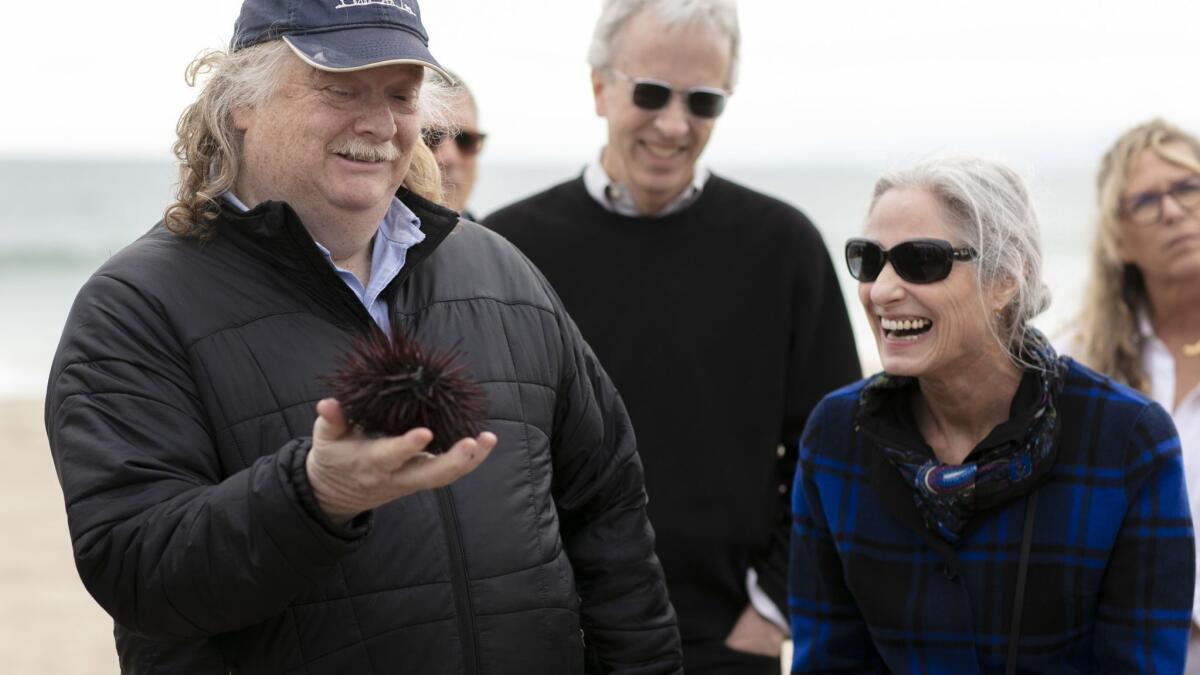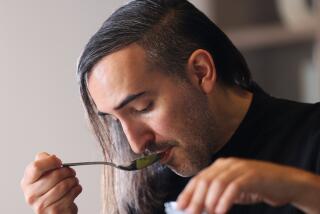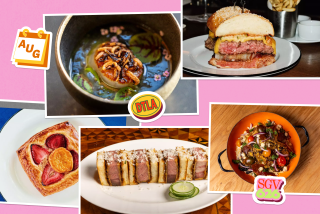He bridged cultural divides and saved the sharks: Jonathan Gold’s brother remembers his impact

Los Angeles is a very difficult place to understand. Cultural anthropologists write peer-reviewed journal articles and books about how our city is unique in its topography, microclimates, biodiversity, cultural and economic diversity, as well as its combination of urban sprawl and extreme density.
Yet none of these academics get L.A. the way my brother Jonathan did.
What I’ve always admired most about Jonathan was his innate ability to bridge cultural divides by writing about the one thing we all love: food. His lyrical prose about the joys of consuming dishes lovingly prepared by immigrants from far-off lands, and the complexity and origin of these dishes, allowed Jonathan to seamlessly bring L.A.’s vast megacity together in a way that social justice leaders have labored to do for decades.
He genuinely felt privileged to explore the world one neighborhood at a time.
Before Jonathan, there was no equity in food reviews. Reviewers focused on Michelin-starred restaurants and ignored those run by Asian, African and Latino immigrants. By writing about the joys of taco trucks and street food, he saved and created hundreds of jobs. Now there are tens of thousands of foodies eagerly tracking the whereabouts of the hottest food truck, all for the chance to wade through traffic and wait in line to eat affordable, extraordinary food.
His writing was all about bringing our sprawling diversity together, even if it meant getting stuck in traffic and increasing our greenhouse gas emissions.
While our president was peddling fear and instituting travel bans, Jonathan was writing about a Syrian restaurant in Van Nuys. He knew that L.A.’s cultural diversity is what made the city unique and extraordinary in the world. He didn’t join the daily cacophony of daily tweets to fight about how immigrants made us better, stronger and more interesting.
Through his personal and selfless writing, he made us excited to experience food and cultural traditions from the very regions that many right-wing leaders were scaring us about.
And we all felt as if we were missing out if we didn’t make the trek to Highland Park, Bell or San Gabriel. His writing was all about bringing our sprawling diversity together, even if it meant getting stuck in traffic and increasing our greenhouse gas emissions.
This brings me to my field of expertise: the environment. Jonathan was no environmentalist. He drove a gas-guzzling Dodge Ram truck that was green only in color. And our friendly “whale wars” over his consumption of Minke whale in Seoul and live octopus in K-town provided entertainment for many.
But his compassion and caring did transcend his love of culture as exemplified in his 2011 op-ed on the “Taste of Extinction.”
While I was still running the environmental group Heal the Bay that op-ed helped me experience the stress that his editors knew all too well. I asked Jonathan to write a piece calling for a shark fin sales ban in California.
I knew he was the only food writer in the country with the credibility in the Chinese community to talk about why saving the 70 million sharks that are killed each year was more important than a revered Cantonese cultural tradition: serving shark fin soup to celebrate life’s most joyous events.
As the bill by Assemblyman Paul Fong eked through committee to committee, I begged Jonathan to finish his piece before the bill died on the Senate floor amid extensive lobbying.
Out of desperation, I wrote my own op-ed and told Jonathan I was going to submit it to the L.A. Times because the Senate vote was quickly approaching.
In typical Jonathan Gold fashion, he cheerfully informed me that he had just submitted his piece earlier in the day.
I wanted to yell at him, but instead I was moved to tears as I realized that his beautifully crafted piece was going to save hundreds of thousands of sharks and provide an essential catalyst for the growing, global shark conservation movement.
And that’s exactly what happened.
Months later at an environmental fundraiser honoring Assemblyman Fong for his conservation success, he noted that Jonathan’s piece “made the difference at a time when the cultural backlash was putting the bill in jeopardy.”
As always, Jonathan was late, but his timing was perfect, and our lives were made richer because of it.
Gold is the associate vice chancellor for environment and sustainability at UCLA.
View all our coverage of Jonathan Gold | 1960 – 2018 »
More to Read
Eat your way across L.A.
Get our weekly Tasting Notes newsletter for reviews, news and more.
You may occasionally receive promotional content from the Los Angeles Times.










